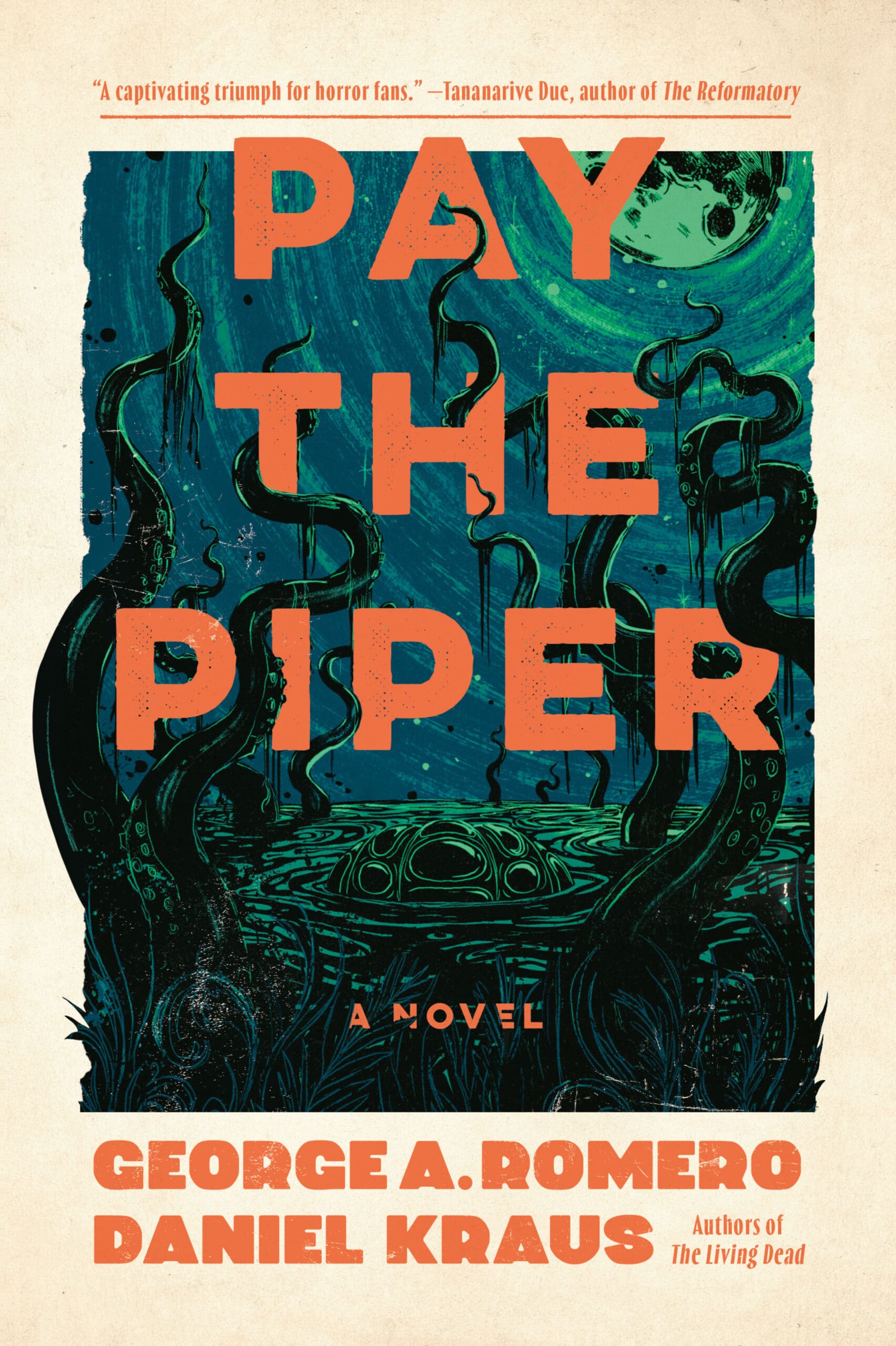
Synopsis
A terrifying tale of supernatural horror set in a cursed Louisiana bayou, from the minds of legendary director George Romero and bestselling author Daniel Kraus.
In 2020, while sifting through University of Pittsburgh Library’s System’s George A. Romero Archival Collection, novelist Daniel Kraus turned up a a half-finished novel called Pay the Piper, a project few had ever heard of. In the years since, Kraus has worked with Romero’s estate to bring this unfinished masterwork to light.
Alligator Point, Louisiana, population 141: Young Renée Pontiac has heard stories of “the Piper”—a murderous swamp entity haunting the bayou—her entire life. But now the legend feels horrifically real: children are being taken and gruesomely slain. To resist, Pontiac and the town’s desperate denizens will need to acknowledge the sins of their ancestors—the infamous slave traders, the Pirates Lafitte. If they don’t… it’s time to pay the piper.
Review
The biggest thanks to the publisher and NetGalley for the eARC!
In the meandering bayous of Southeast Louisiana, people are going missing. With every passing day, the oil man makes his rounds to offer folks a sizable sum of cash for their land in the small town of Alligator Point. But the money isn’t the only reason the population is dropping. A visitor in the night that calls you by name seems to be responsible for the missing children of what feels like a forgotten land, a place with its own rules of survival. Miss Pontiac, wise beyond her nine years of age, knows something isn’t right in the place she calls home. A story of horrific atonement, Pontiac finds herself among the townsfolk of Alligator Point fighting for her home and making right the injustices of the past.
Oh, where to begin with this review? It would be remiss of me not to mention the personal significance a novel like this holds, given I was born and raised on the bayous of South Louisiana. My childhood was spent learning to fish with a kid’s Tweety Bird rod and reel, walking in the gravel down the bayou barefoot to play in the high tide, and begging my dad to check crab traps with me every fifteen minutes just in case we hit the jackpot. What Kraus and Romero have crafted with this story has touched the deepest parts of my Cajun heart, bringing back memories of my great-grandmother’s Cajun French, the child that was raised in the marshes of Montegut, Louisiana, and the seemingly eccentric, yet heartfelt culture that feels integral to my identity.
Personal ties aside, Pay the Piper is a wildly fun, yet profound horror novel that undoubtedly seeps with character and personality. Part of being a Cajun is having crazy ass nicknames for all your “padnas” (friends or buddies), believing in your own kind of “gris-gris” (a joking curse), and saying whatever the “fuck-damn” you please (my new favorite swear). On top of these cultural landmarks highlighted in this novel, Alligator Point is defined by its sweltering heat and oppressive humidity, the small town thriving on the shrimpers and trollers as a way of life. These aspects are captured flawlessly by Kraus and Romero making for an immersive read, one that places you squarely in the heart of the disappearing South.
And disappearing it is, on many levels. While there are many charming aspects of this way of life, there’s no mistaking that it’s a hard way of living. Not only are the folks of Alligator Point turning up brutally slaughtered or outright leaving, but the people who are staying are rotting. The land is disappearing due to coastal erosion and the surviving townsfolk are dying of cancers, addictions, and other untreated afflictions. This feeling of decay that exists in the bayou adds to the growing sense of horror for this fading community, one that was built upon the success of sin. The Piper’s wrath knows no bounds as detailed in the grotesque descriptions of what remains of his victims. The emergence of this evil entity feels like the dramatic allegories of Cajun lore shared over beers. However, it’s time to pay the price for the misdeeds of the past, a time to get clean.
Nine-year-old Pontiac, a girl who knows no life other than that of Alligator Point, feels like the greatest characterization of this call for change. She has a habit of walking around with a notebook and pencil everywhere she goes, recording quite literally, everything. Smart as a whip and taking shit from absolutely no one, Pontiac is someone who understands the importance of taking note of even the most inconsequential of things, the importance of remembering and recognition. While she can’t fix the sins of the past or the wrongs committed by those who came before her, she surely is aware of her surroundings, the implications of every such action in a place struggling to stay afloat. Her tenacity, grit, intelligence, and fearlessness easily make her one of my favorite characters I’ve read in recent memory all within this unique, symbolic landscape.
What Daniel Kraus has created from the framework of George Romero’s making is full of character, quirk, and Cajun heart. The pacing moves at times like the stagnant humidity of the swamp with a mounting sense of dread accumulating with each member of Alligator Point we meet. Not unlike the reality of living in the South, no one is in a particular hurry to get to the bottom of things with the exception of Pontiac, a Cajun gal after my own heart. She absolutely steals the show, delivering moments of comedic levity as well as emotional growth. Sure, there’s a little lagniappe here – a little something extra – with all these characters and all this culture, but I’d argue vehemently that this is what makes this book so damn endearing. Pay the Piper feels like a cultural snapshot of the Southern way of life, the artistic rendering of a snake eating its own tail as the errors of the past must be atoned for in the name of survival, a time to sink or swim.
Pay the Piper by George Romero and Daniel Kraus releases on September 3rd from Union Square & Co.









Leave a Reply